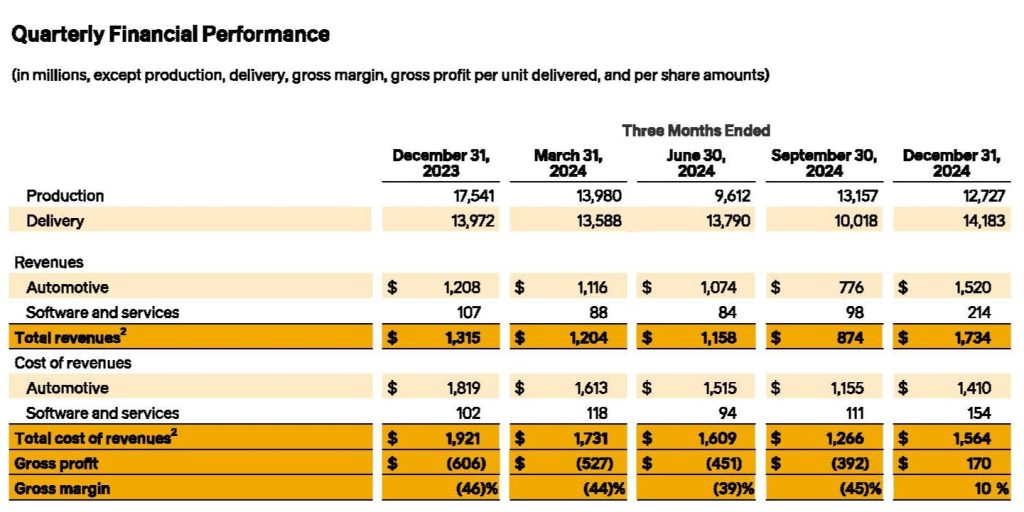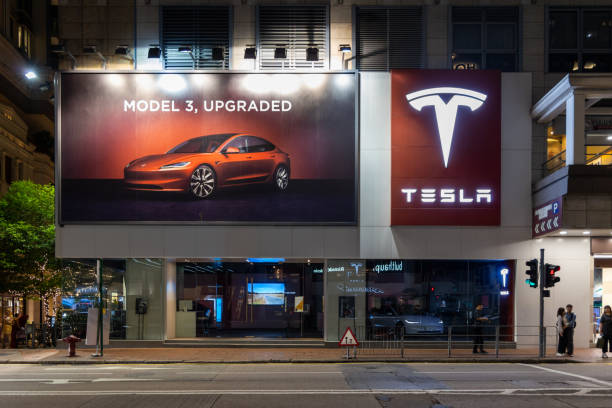Rivian Reaches Key Milestones, Yet Faces Headwinds Ahead

TradingKey - Rivian has announced an important milestone in february 20, reporting its first-ever "positive gross profit" for the fourth quarter of 2024. The California-based automaker achieved a gross profit of $1.73billion in the fourth quarter, significantly exceeding Wall Street's expectations of $1.4billion.
TradingKey analyst Petar Petrov attributes this positive sales result to rising sales prices, increased regulatory credit sales, and growth in software services.
 Source: Rivian
Source: Rivian
Following this news, Rivian's stock rose by 7% in after-hours trading, though some gains were later retraced.
Cost Reductions Signal Good News
CEO RJ Scaringe noted that Rivian has reduced the manufacturing cost per vehicle by $31,000. The company has adopted a new "zonal" system to replace its previous domain-based architecture, a move only Tesla has previously undertaken in the auto industry. This change means fewer electronic control units (ECUs), less wiring, and most importantly, lower production costs. With the new zonal architecture, Rivian has reduced the total number of ECUs from 17 in its first-generation R1 vehicles to just 7.
Additionally, Rivian is now offering lithium iron phosphate (LFP) battery options, expecting a range of 270 miles. LFP batteries are generally less expensive to manufacture than high-nickel counterparts, and Rivian aims to improve battery pack structural integrity through high-pressure die-casting by integrating numerous components. The company has also revamped high-nickel battery packs to save "thousands of dollars in costs."
Next Potential Growth Opportunities
In November, Rivian announced an expansion of its partnership with Volkswagen (VWAGY), with the German automaker increasing its investment in their joint venture. Rivian will provide electric vehicle architecture and software for Volkswagen's next-generation models. The company stated on Thursday that the combination of a DOE loan, capital from the VW partnership, alongside its current cash reserves, "is expected to provide the capital resources to fund operations through the ramp of R2 in Normal, Illinois, as well as the midsize platform in Georgia—enabling a path to positive free cash flow and meaningful scale."
Rivian plans to begin production of the R2 model in Normal early next year, with significant scaling expected once the new manufacturing facility in Georgia is completed.
Performance Guidance Shows Challenges Ahead
During a conference call, Chief Financial Officer Claire McDonough indicated that seasonal factors and California wildfires would lead to a decline in delivery volumes in the first quarter. McDonough projected total deliveries for the first quarter to be only 8,000 vehicles, with production at 14,000 vehicles.
The company has also estimated that electric vehicle sales for 2025 will be between 46,000 and 51,000 units, which is below Bloomberg analyst averages of approximately 54,800 units and lower than Rivian's 2024 sales of 51,579 vehicles. Adjusted earnings before interest, taxes, depreciation, and amortization (EBITDA) is projected to be between a loss of $1.7 billion and $1.9 billion.
Petrov suggests that despite the robust fourth-quarter results, Rivian's outlook appears mixed, as management's tone was notably cautious. There remains considerable uncertainty surrounding future government policies related to electric vehicles, particularly regarding the loan promised to Rivian during President Biden's final months in office. With the company still operating at a loss, securing additional funding is critical for its survival.
Rivian Faces Potential Headwinds
One recurring issue is the declining demand for electric vehicles (EVs). Electric vehicles still face barriers among consumers, including the fact that they typically cost more than comparable gasoline-powered vehicles. North American automakers must also contend with changing consumer preferences and manufacturing challenges, with buyers anticipating more delays, cancellations, and strategic shifts from major automakers in the coming years.
Potential policy changes in Washington could further dampen demand for EVs. One of the first actions taken by the government during the election season was an executive order committing to abolish what President Trump referred to as the "mandates" on electric vehicles proposed by President Biden.
Trump has also threatened tariffs on automotive suppliers in Canada and Mexico, as well as on raw materials like steel and aluminum. Ford CEO Jim Farley has stated that such policies could "destroy" the American automotive industry.
Another significant regulatory uncertainty is the status of federal electric vehicle tax credits, with Trump and the Republican party indicating they might seek to eliminate this policy. The Trump administration has frozen EV charging fund allocations and is moving to rescind aggressive emissions rules that the Biden administration claimed would necessitate an increase in the production of EVs to comply.
Furthermore, the government paused a $5 billion national EV charging station construction plan on February 6. The $7,500 personal retirement account (IRA) tax credits for each EV are also expected to be phased out no later than 2025.
According to Yang Zifei, head of the passenger vehicle project for the non-profit International Council on Clean Transportation, the U.S. is "at a nascent stage of EV adoption." This suggests that without government incentives and stringent emissions standards, EVs may struggle to enter the mainstream market. Analysts have all lowered their forecasts for U.S. EV sales.
.png)
Source: Sustainable Views
Moreover, the successful acquisition of loans approved by the previous administration could significantly impact Rivian's funding. Before Trump's government, Georgia had reached a loan agreement worth up to $6.6 billion with the U.S. Department of Energy, part of the Advanced Technology Vehicles Manufacturing (ATVM) program, which will support Rivian's upcoming assembly plant on the outskirts of Atlanta.
However, Georgia's Governor Brian Kemp recently expressed uncertainty over the status of this funding. Rivian CFO McDonough stated that the automaker "looks forward to working with the new administration."








